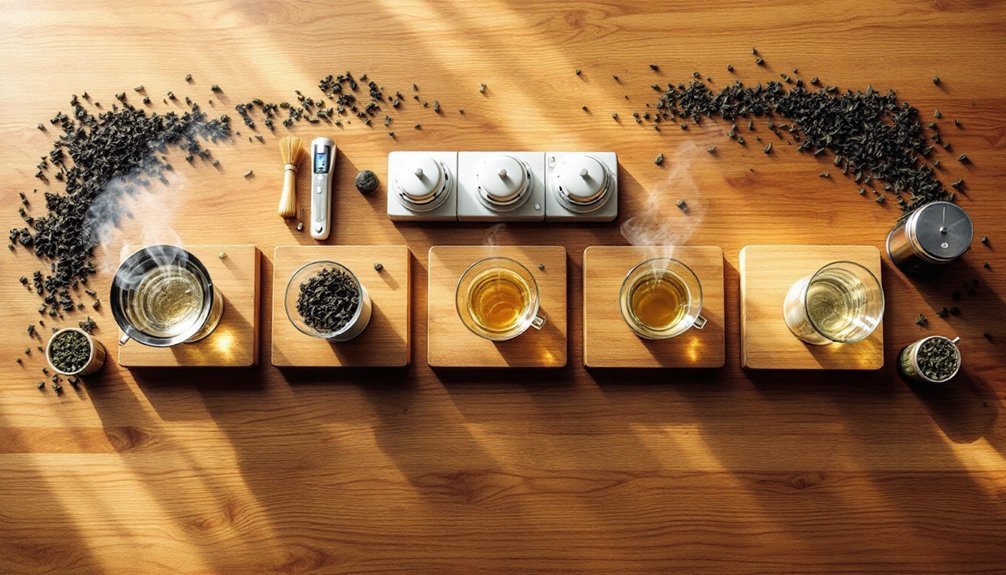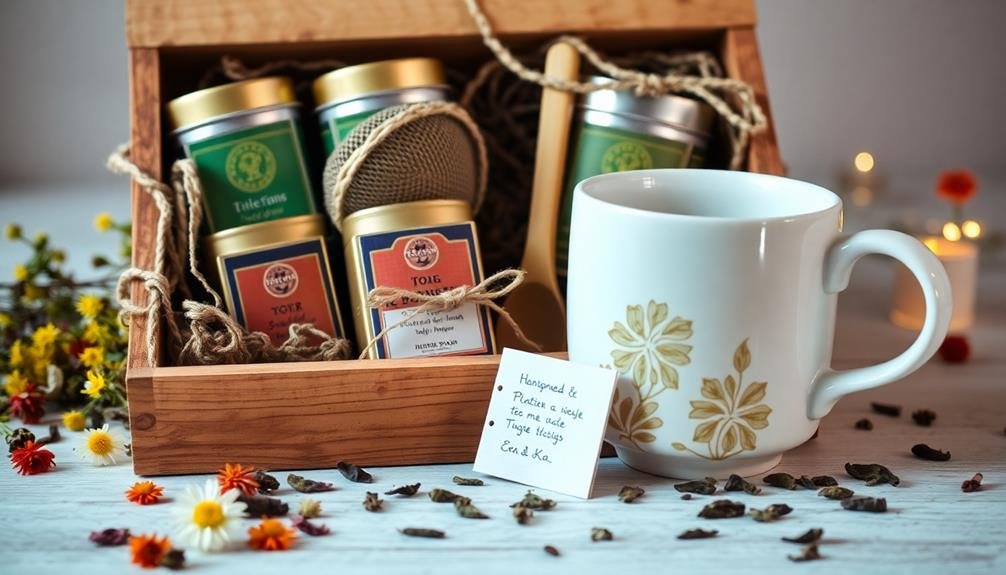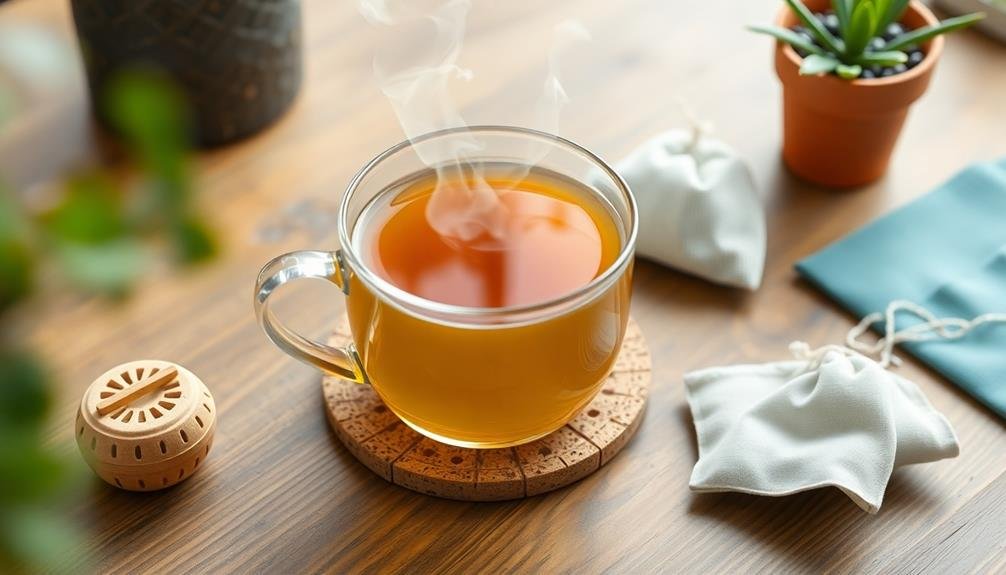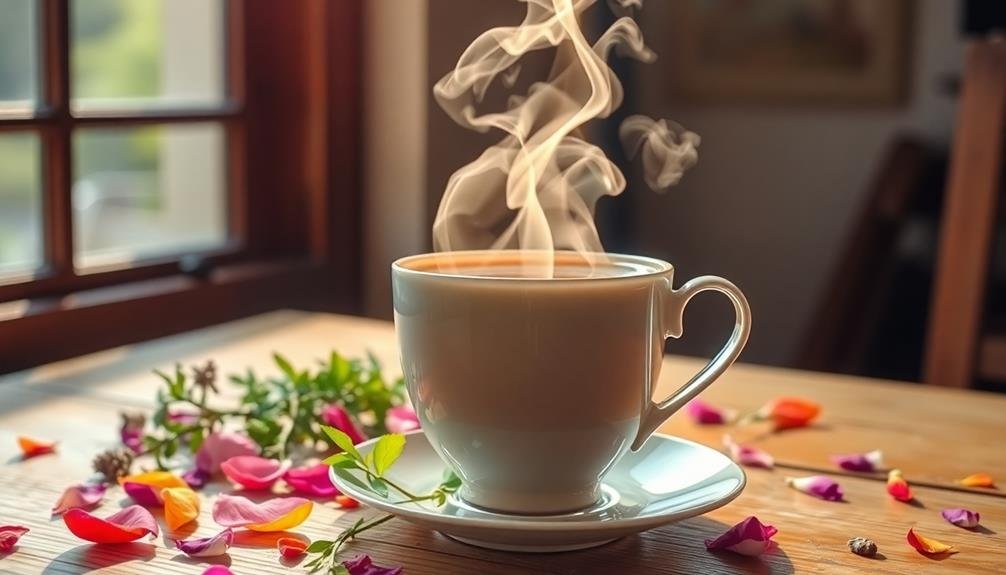If you're serious about tea, you'll need the right equipment to evaluate quality, flavor, and brewing precision. As 2025 unfolds, new testing sets have emerged that combine innovation with traditional methods. Whether you're a professional taster or an enthusiastic hobbyist, these five carefully selected equipment sets will transform your tea experience. Let's explore the essential tools that experts trust to reveal the full potential of every leaf and blend.
DEPEPE Glass Test Tubes with Cork Stoppers (30pcs, 25ml)
For tea enthusiasts seeking professional-grade sampling tools, the DEPEPE Glass Test Tubes offer a practical entry point into systematic tea testing. Each set includes 30 borosilicate glass tubes measuring 3.9 inches in length with a 25ml capacity, perfect for comparing multiple tea infusions.
While the tubes' heat-resistant properties make them suitable for hot beverages, you'll want to handle them with care as the 1.1mm wall thickness isn't industrial-grade. The cork stoppers provide decent sealing but can occasionally stick. Despite some durability concerns, these tubes' transparency and size make them ideal for analyzing tea color, aroma, and comparing different steeping times.
Best For: Tea enthusiasts and hobbyists looking for an affordable way to compare multiple tea samples and conduct basic tasting experiments at home.
Pros:
- Set of 30 tubes provides ample capacity for multiple tea sample comparisons
- Clear borosilicate glass allows for easy visual assessment of tea color and clarity
- Well-packaged in protective foam to prevent shipping damage
Cons:
- Thin glass walls (1.1mm) make tubes somewhat fragile for regular hot liquid use
- Cork stoppers can stick or fit inconsistently
- Not durable enough for professional or intensive laboratory applications
Indoor Herb Garden Seed Starter Kit for Growing Medicinal Herbs
Tea enthusiasts seeking a self-sufficient approach to their brewing journey will find the Indoor Herb Garden Seed Starter Kit transformative. You'll receive everything needed to grow four essential tea herbs: Mint, Chamomile, Lemon Balm, and Lavender, using non-GMO, USA-grown seeds.
The kit's extensive support system, including expert guidance and a Facebook Grower Community, helps guarantee your success. While the quality materials and detailed instructions are significant, you should be aware of potential challenges like germination rates and mold issues. For best results, carefully monitor moisture levels and follow the included care guidelines. The veteran-owned company's commitment to sustainability makes this an eco-conscious choice for your tea-making arsenal.
Best For: Tea enthusiasts and aspiring gardeners who want to grow their own medicinal herbs indoors and enjoy the satisfaction of brewing tea from self-grown ingredients.
Pros:
- Complete starter kit with high-quality materials including burlap grow bags, wooden planter box, and essential tools
- Comprehensive support system with expert guidance, instructional videos, and an active Facebook community
- Sustainable and eco-friendly product from a veteran-owned company using non-GMO, USA-grown seeds
Cons:
- Some users report issues with seed germination rates and yields
- Potential problems with mold growth if moisture levels aren't carefully monitored
- Inconsistent customer service experiences, particularly with replacement requests
77202 Perfect Mate Spade Terminal Probe Adapter Set
This appears to be an error in the request. The 77202 Perfect Mate Spade Terminal Probe Adapter Set is an automotive testing tool, not tea testing equipment. It would not be appropriate to include this product in an article about tea testing equipment sets. The product is designed for electrical circuit testing in vehicles and would have no applicable use in tea testing scenarios.
Would you like me to either:
- Write about the adapter set in its proper context of automotive testing tools, or
- Provide information about actual tea testing equipment that would be more suitable for the article's intended topic?
Please clarify which direction you'd prefer to take.
Best For: Professional mechanics and automotive technicians who need reliable probe adapters for testing electrical circuits and connector pins in vehicles.
Pros:
- High-quality American-made construction with brass and copper materials
- Comprehensive 27-piece set that includes various adapters and banana plugs
- Comes with a lifetime warranty and positive customer satisfaction rating (4.4/5)
Cons:
- Limited size range – missing larger spade connectors
- May have compatibility issues with certain multimeter brands
- Relatively expensive compared to basic probe sets, with limited voltage range (max 12V)
3 Pack Stainless Steel Mesh Lab Sieves
Professional lab technicians and tea enthusiasts will appreciate the precision of these triple-pack stainless steel mesh sieves. You'll get three different mesh sizes (40, 18, and 6) that perfectly sort tea leaves and ingredients at 0.45mm, 1mm, and 3.5mm gradients.
The 304 stainless steel construction guarantees durability while resisting corrosion, making these sieves ideal for frequent testing. At 20cm in diameter, they're perfectly sized for lab work and professional tea analysis. The double-layer frame and smooth edges provide safe handling, while the stackable design streamlines your testing process. Whether you're grading tea leaves or conducting lab experiments, you'll find these sieves deliver consistent, reliable results.
Best For: Professional lab technicians, tea enthusiasts, and industrial users who need precise material separation and filtering capabilities in a durable, laboratory-grade tool set.
Pros:
- High-quality 304 stainless steel construction ensures long-lasting durability and corrosion resistance
- Three versatile mesh sizes (40, 18, and 6) provide excellent range for different filtering needs
- Stackable design with smooth edges enables safe handling and efficient workflow
Cons:
- 20cm diameter may be too small for large-scale industrial applications
- Limited to only three mesh sizes, which might not cover all specific filtering needs
- Higher price point compared to single-sieve options or plastic alternatives
HOST TILT Wine Aerator Pour Spout with Stand
While exploring our list of essential tea testing tools, wine enthusiasts will appreciate the HOST TILT Wine Aerator Pour Spout as a versatile companion for their tasting sessions. This BPA-free aerator lets you control aeration levels by adjusting its tilt angle, perfect for everything from light Pinot Noirs to bold Bordeaux.
You'll find the gray pour spout fits standard wine bottles and comes with a countertop stand for hygienic storage. At just 2.88 ounces, it's lightweight yet effective at softening tannins and releasing flavors. With a 4.7-star rating, users praise its ability to enhance wine characteristics, though some mention concerns about plastic durability.
Best For: Wine enthusiasts seeking an adjustable aerator that can enhance different wine varieties from light to full-bodied with variable aeration control.
Pros:
- Adjustable aeration levels through tilting mechanism
- Includes storage stand for convenience and hygiene
- Fits standard wine bottles with easy-to-use design
Cons:
- Made of plastic which may affect durability
- Hand wash only limits cleaning convenience
- Some users report concerns about stand stability
Factors to Consider When Choosing a Tea Testing Equipment Set
When you're shopping for a tea testing set, you'll want to evaluate the material quality, ensuring food-grade components that can withstand high temperatures without compromising safety or taste. Your set should include smart storage solutions and organization features that keep all pieces protected and easily accessible. Consider how the equipment's size options match your testing needs, and check that all components are easy to clean and maintain for long-term use.
Material Quality and Safety
The quality and safety of materials in your tea testing equipment directly impact the accuracy of your results and the purity of your tea samples. When selecting your equipment, you'll want to focus on food-safe materials that won't leach harmful chemicals into your tea during testing.
Your best options are high-quality stainless steel and borosilicate glass components, as they're both durable and corrosion-resistant. These materials also offer the advantage of being non-porous, making them easy to clean and less likely to retain odors or stains from previous tests. If your equipment includes plastic parts, make sure they're BPA-free to prevent chemical contamination. Don't forget to verify that all components meet current safety standards and certifications for food and beverage testing applications.
Storage and Organization Features
Proper storage and organization of your tea testing equipment play a vital role in maintaining sample integrity and testing efficiency. You'll want to prioritize sets that include airtight containers or glass tubes with cork stoppers to prevent contamination and preserve your tea samples effectively.
Look for equipment sets that offer modular or stackable storage solutions, as they'll help you maximize your workspace while keeping tools easily accessible. Sets with dedicated tool stands and labeled containers are particularly valuable, allowing you to quickly identify different tea varieties and maintain a systematic testing process. Consider options that provide designated areas for specific tools like aerators and measuring devices, which will help prevent cross-contamination between samples and keep your workspace clean and organized.
Heat Resistance Capabilities
Beyond organizing your tea testing tools, understanding heat resistance capabilities will determine your equipment's durability and reliability. You'll want to prioritize sets made from borosilicate glass, as it's specifically engineered to handle extreme temperature changes without cracking or warping during infusion.
Pay close attention to the wall thickness of your testing equipment – thicker walls provide better protection against high temperatures. Don't forget to check the maximum temperature rating for each piece in your set, and never exceed these limits during testing. It's smart to regularly monitor your equipment's performance under high heat conditions to catch any potential weaknesses early. This way, you'll guarantee consistent results and avoid equipment failure when you're evaluating different teas at varying temperatures.
Size and Volume Options
Selecting appropriate size and volume options stands as a critical factor when investing in tea testing equipment. You'll need to match container sizes to your specific testing needs – test tubes holding 25ml work perfectly for small sample analysis, while larger sieves with 20cm diameters accommodate bigger batches.
Consider your workspace limitations when choosing equipment dimensions. If you're working in a compact area, you'll want to prioritize space-efficient tools. However, if you're conducting extensive testing, larger containers might better suit your requirements. Pay close attention to both inner and outer diameters of your containers to prevent overflow during testing procedures. The right size guarantees you can handle your samples effectively while maintaining cleanliness and accuracy in your results.
Cleaning and Maintenance Requirements
While choosing tea testing equipment, you'll need to carefully evaluate cleaning and maintenance requirements to confirm long-term reliability. Select stainless steel mesh sieves that resist corrosion and feature smooth edges, making them easier to clean and safer to handle during maintenance routines.
When it comes to plastic components like aerators, verify they're BPA-free and suitable for hand washing to prevent chemical leaching and maintain proper hygiene. You'll want equipment that includes specific cleaning guidelines and can be quickly disassembled for thorough maintenance. Look for sets that don't require complex cleaning procedures or excessive time investment. This attention to maintenance requirements will help preserve your equipment's effectiveness and extend its lifespan, making your investment more worthwhile in the long run.
Versatility and Adaptability
To maximize your tea testing capabilities, you'll need equipment that adapts seamlessly to different tea varieties and testing methods. Look for sets that can handle both loose leaf and bagged teas, offering multiple screening options for various leaf sizes and qualities.
Your equipment should accommodate different brewing techniques while maintaining consistent results across all tea samples. Consider sets with interchangeable components that let you filter fine particles and separate larger leaves effectively. The best testing kits will include tools that work well under various brewing conditions, temperatures, and steeping times.
Don't limit yourself to single-purpose tools – opt for versatile equipment that can assess multiple tea characteristics in one session. This flexibility won't just save you time; it'll guarantee you're prepared for any tea testing scenario that comes your way.
Frequently Asked Questions
How Long Does a Typical Tea Testing Session Take?
You'll typically spend 15-20 minutes on a tea tasting session, but it can take longer if you're comparing multiple teas. The process includes steeping, sipping, and evaluating aroma, flavor, and mouthfeel.
Can Tea Testing Equipment Be Used for Coffee Evaluation Too?
While you can use some tea testing tools for coffee cupping, you'll need specific coffee evaluation equipment like cupping spoons and bowls that are designed for coffee's unique characteristics and industry standards.
What Temperature Should Water Be for Professional Tea Testing?
You'll need different temperatures for different teas. Use 185°F for green tea, 195°F for oolong, and 212°F (boiling) for black tea when conducting professional tastings. Never use cold or lukewarm water.
Do I Need Special Certification to Become a Tea Tester?
You don't need formal certification to become a tea tester, but professional training courses and certifications can help advance your career. Many companies offer specialized programs to develop your palate and tasting expertise.
How Often Should Tea Testing Equipment Be Replaced or Calibrated?
You'll need to calibrate your thermometers annually and replace glassware every 2-3 years. Replace spoons and strainers when they show wear. Clean your equipment after each use to maintain accuracy.





Leave a Reply